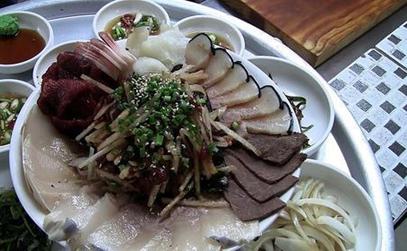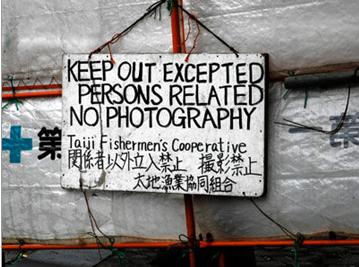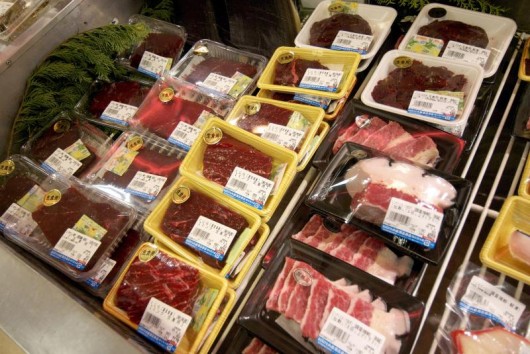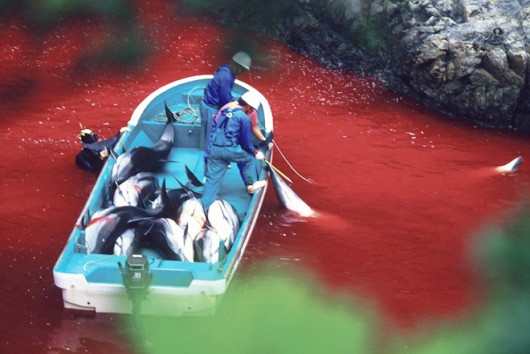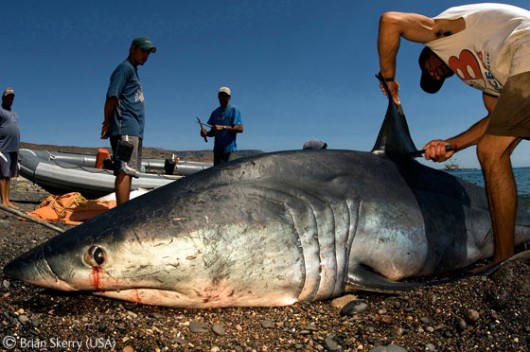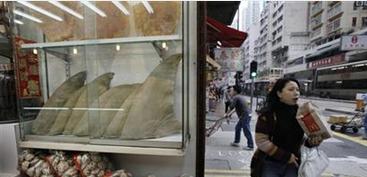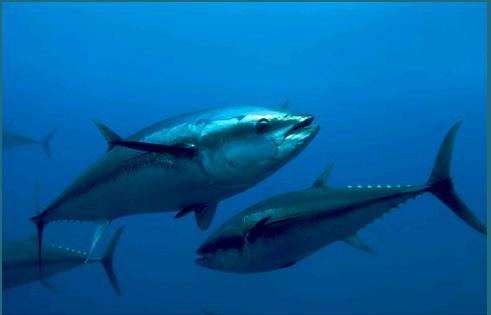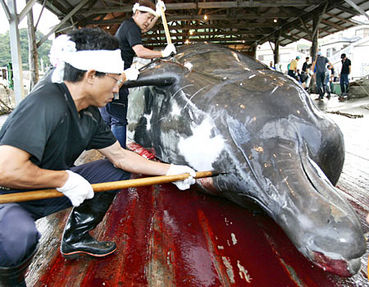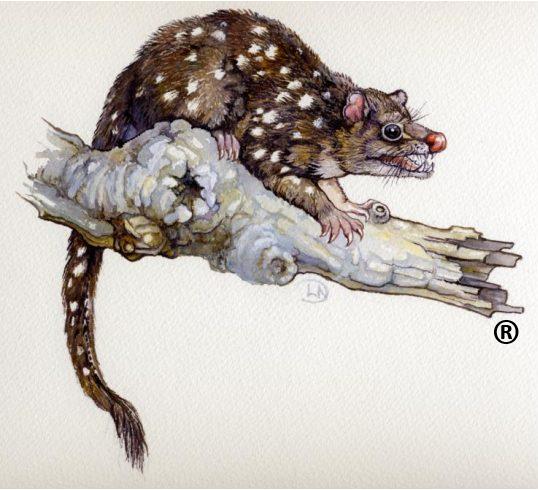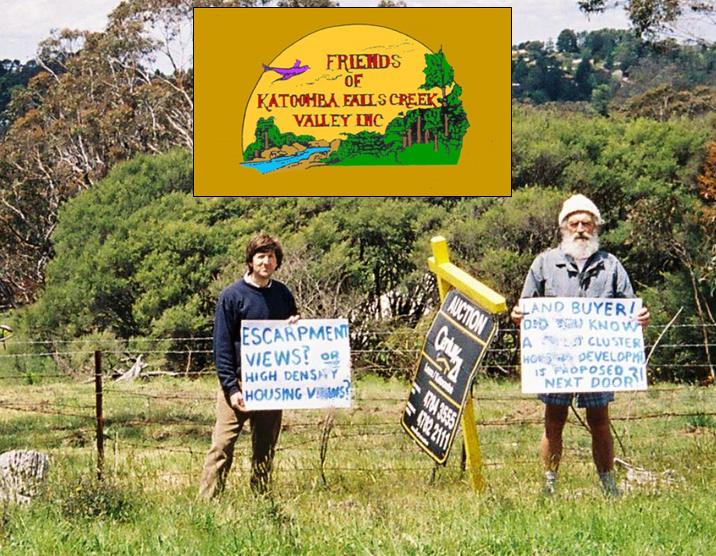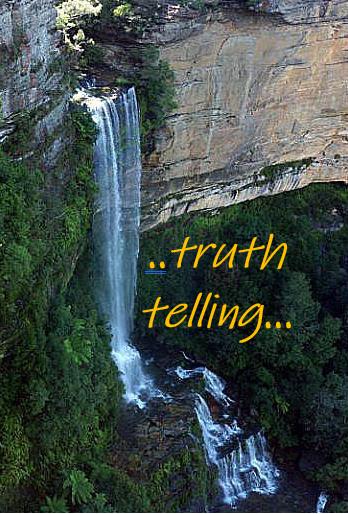Ban whaling vessels from using our ports
Sunday, February 10th, 2013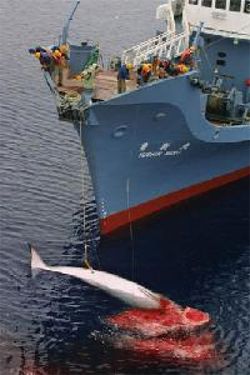 Japanese Whale Blood Sport
…at it again, trespassing and poaching in Australian waters!
Japanese Whale Blood Sport
…at it again, trespassing and poaching in Australian waters!
.
One would assume that an organisation entitled the ‘Australia Strategic Policy Institute‘ would be a government body or a body at least having Australia’s strategic interests at heart.
But its director, Dr Anthony Bergin, with a title one would assume would be capable of research, has written an article for Fairfax media supporting Japan’s strategic interests.
Bergin’s article: ‘Ban Protest Vessels from using our Ports‘ dated 16th January 2010 in The Age newspaper sides with the Japanese whalers and calls on the Australian Government to support Japan in denying protesters access to Australian ports.
Perhaps Dr Bergin should take up residency in Taiji and become an employee of their Institute of Cetacean Research.
If Dr Bergin were respectful of the democratic rights to protest we have in Australia and recognised the Japanese incursion in Australia’s whale sanctuary in the Southern Ocean, and respected the existence rights of whales, then perhaps his article for Fairfax would have instead read like this…
The Australian Government has been far too even-handed in its statements about the reckless actions of the Japanese whalers trespassing in the Southern Ocean in breach of commercial whaling prohibitions.
By not condemning this annual intrusion by Japanese ships undertaking commercial whaling, Australia is in effect acquiescing in illegal poaching of whales, while Sea Shepherd does Australia’s naval monitoring of illegitimate Japanese whale poachers. Harassment will not change Japan’s position on whaling. And not condemning these Japans actions is counterproductive for Australia trying to secure its protection of endangered whales with the International Whaling Commission.
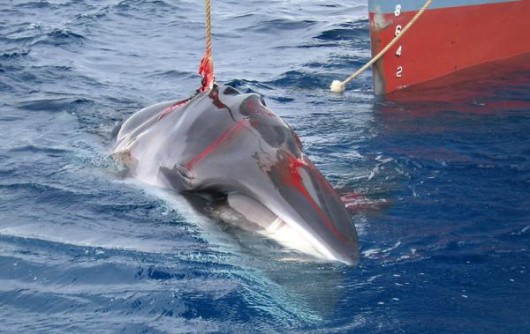 Whale Watching:
A Minke Whale is harpooned by the Japanese whaling vessel Yushin Maru 2
in Australia’s Southern Ocean
Whale Watching:
A Minke Whale is harpooned by the Japanese whaling vessel Yushin Maru 2
in Australia’s Southern Ocean
.
Australia could legitimately take Japan to court and hold Japan in breach of the Antarctic Treaty at the next meeting of the commission in Morocco in June 2010. Australia could legitimately and formally demand Japan to cease its whaling actions immediately.
Given the public interest in these matters, the Australian Government has sensibly asked the Australian Maritime Safety Authority to examine the recent events in the Southern Ocean. Yet it is hard to see how, on any reading of the Convention on the International Regulations for Preventing Collisions at Sea, that the ramming of the Sea Shepherd vessel, the ‘Ady Gil‘, by the Japanese whaling vessel, could argue his actions were in compliance with it.
On January 6, 2010, the New Zealand flagged tri hull wave piercer, Ady Gill, was stationary in the water at the time of the ramming and no action was taken by the Japanese whaling vessel to avoid a collision. In fact the ship’s master the Japanese whaling ship, the ‘Shōnan Maru 2‘ deliberately turned away from its course toward starboard to deliberately ram and sink the Ady Gil.
.
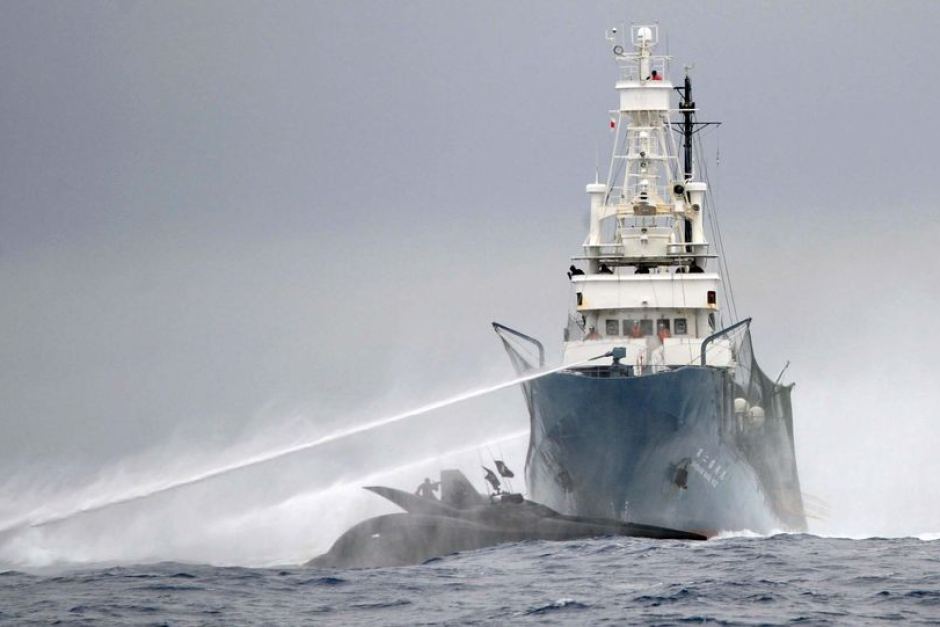 Japanese Attack Formation – caught on video by Sea Shepherd’s MV Bob Barker
Japanese Attack Formation – caught on video by Sea Shepherd’s MV Bob BarkerOn 6th January 2010, in Australia’s Southern Ocean, the traspassing ‘Shōnan Maru 2′ deliberately rams the stationary Ady Gil
Australia lets the ship’s master and company Kyodo Senpaku Kaisha off ‘Scott’ free! (click image to enlarge)
.
“The crew of the Ady Gil claimed that, at the last moment, the ‘Shōnan Maru 2′ turned to starboard, changing its heading to 30 degT6 and colliding with the port sponson and then smashing off a 3 metre section of the bow of the Ady Gil.”
At the time the Shōnan Maru 2 was believed to be under command of Master Toshiyuki Miura, an employee of Japanese company Kyodo Senpaku Kaisha.
[Source: ‘AMSA Report on Ady Gil Collision’, ^http://www.amsa.gov.au/shipping_safety/incident_reporting/documents/amsa-report-on-ady-gil-collision.pdf].
Watch Video:
.
Piracy and criminality at sea deserve more than a token ‘fact finding report‘ that concludes nothing:
<<On the basis of the available evidence, AMSA has been unable to determine whether either vessel took any action intended to cause a collision. In the absence of face-to-face interviews with all the parties involved, the value of the publicly posted video footage was limited. The lack of confirmation of the validity of the source of this footage and therefore its limited evidentiary value prevented definitive conclusions being drawn.”>>
.
Read Report: >AMSA Report on Ady Gil Collision (2010).pdf (22 pages, 1.1MB)
.
It’s called a diplomatic whitewash. Australia and New Zealand didn’t even receive an apology from the Japanese Government.
.
To demonstrate that Australia does not support the activities of the Japanese whalers, the Australian Government should ban the entry of its vessels into Australian ports.
In deciding whether to grant consent to vessels to enter its ports, a state is free to impose conditions as it wishes – access to a port of a state is a privilege, not a right.
Australia banned port access to Japanese fishing vessels in 1998 when Japan would not agree on a total allowable catch for Southern Bluefin Tuna in the Commission for the Conservation of Southern Bluefin Tuna. The port access ban was lifted in mid-2001. Why? It is an offence under the Environment Protection and Biodiversity Conservation Act for a whaling vessel to call at an Australian port unless the master has written permission from the environment minister to bring it into the port.
If the Federal Government is serious about ending whaling and shifting the Japanese Government’s position – one that has hardened in response – it should directly monitor all whaling activities in the Southern Ocean, follow through on its promise to take legal action against Japan, ban all whaling vessels from Australian ports and ban all use of aircraft from Australian airports for use by Japanese whalers.
Dr Anthony Bergin needs to continue his research and then get back to us with what he has learnt.
.
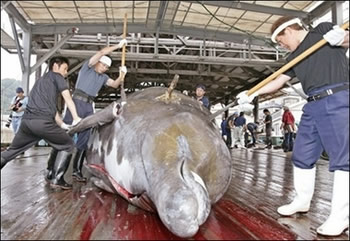 To Japanese Whale Sportsmen, it’s just big game fishing
It’s the thrill of the harpooning!
The whale meat doesn’t matter
The ‘research’ label is to keep Greenies distracted in courts
To Japanese Whale Sportsmen, it’s just big game fishing
It’s the thrill of the harpooning!
The whale meat doesn’t matter
The ‘research’ label is to keep Greenies distracted in courts
.
.
Comment by Anonymous 20100117:
.
<<We urgently need leadership.
How is it that whaling authorities, or ‘spies’, were allowed to hire Australian planes to spy on anti-whaling protest ships!
Where are our border controls, our security forces? Australia is a sovereign nation, one to be proud of and patriotic towards. However, we have leaders cowering to Japan’s superior powers, and all their rhetoric about “legal options” and “diplomatic pressure” are just forms of procrastination, a smoke-screen for the public.
It is becoming clear that some agreement has been made between Japan and Australia to prevent any “interference” to their whale slaughter.
Head of the Australian whaling envoy, Sandy Holloway, is set to receive up to $200,000 for 100 days work. Costs could escalate to one million dollars as bureaucrats travel the globe in a futile effort to stop Japan killing whales.
Mr Holloway’s ‘formal representations’ to Japan, on a $1,800 a day retainer, were designed to fail and are really an expensive smokescreen to fool the Australian public.
Such was the ambiguity of diplomatic pressure that Japan even asked Australia for help against the “eco-terrorists” upholding the laws in the Antarctic!
Public money is being wasted. Australia’s Antarctic Territory, a $300 million whale-watching industry, domestic and international laws and Treaties are being abandoned in an effort to secure economic agreements with Japan.
Our government’s “anti-whaling” stance, despite pre-election pledges, is a charade. It is time we see some leadership from our Federal government and have Japan’s illegal whaling fleet permanently removed from the Antarctic. We urgently need leadership at this time, but clearly we won’t be getting it from our present government!>>
.
Comment by Peter Bright (20100117):
.
The Prime Minister has to overview the whole picture in the national interest, long term as well as short term. Although a Green, I believe that he and his government are being unfairly criticised and insultingly abused with insufficient cause.
A better understanding of any problem may sometimes be gleaned by putting oneself in the position of one’s despised target and considering matters from his point of view.
To protect the welfare of this nation Mr Rudd has to very carefully consider the reciprocal benefits of trade between Australia and Japan, as well as a whole lot of other factors and subterranean international innuendos the likes of which we could only guess at. Mr Rudd surely realises this, and so do his advisors.
In Mr Rudd’s position, with his huge and numerous responsibilities, I would not expect to last even a minute. Personally, I’m grateful he’s there.
Because of trade matters, and in the interests of keeping the peace, I suspect that the Japanese whalers down south could ram half the Australian navy without provoking Mr Rudd into showing retaliatory muscle.
Of course if I was the commander of an Australian naval ship that had just been rammed down there, I would, um, deal with the problem there and then.
It’s likely that my response would be something less than one fully loaded with diplomatic tact and courtesy.
[Ed: Like seizing and impounding the Japanese vessels, arresting the crews, and summoning the Japanese ambassador to the Australian Prime Minister’s office.]
.
If Australia’s Prime Minister sides with Japan against Australia, what right does Rudd have to represent Australia as Prime Minister.
Rudd already sides with China and speaks fluent Chinese. Does he have similar allegiances to Japan?
Australia must escort Japanese vessels (which have a home territory 5000 or more kilometres north) out of Australian waters. Rudd has become a treacherous Prime Minister, favouring the rights of foreign powers over Australian sovereign rights. In doing so, Rudd has breached the Australian Constitution and must be sacked immediately.
1. Australian Antarctic Territory breached
2. Whale Protection Act, 1980 breached ‘Part I – Preliminary 6. Application of Act
(1) This Act extends to every external Territory and, except so far as the contrary intention appears, to acts, omissions, matters and things outside Australia, whether or not in a foreign country.
(2) Subject to subsection (3):
(a) to the extent that a provision of this Act has effect in and in relation to any waters or place beyond the outer limits of the exclusive economic zone, that provision applies only in relation to Australian citizens domiciled in Australia, Australian aircraft and Australian vessels and the members of the crew (including persons in charge) of Australian aircraft and Australian vessels; and
(b) to the extent that a provision of this Act has effect in and in relation to Australia or any waters other than waters referred to in paragraph (a), that provision applies in relation to all persons, aircraft and vessels, including foreign persons, foreign aircraft and foreign vessels.
(3) This Act has effect subject to the obligations of Australia under international law, including obligations under any agreement between Australia and another country or countries.
Part II – Preservation, conservation and protection of whales
9. Killing, taking etc. of whales prohibited
(1) A person shall not:
(a) in waters to which this Act applies, kill, injure, take or interfere with any whale; or
(b) treat any whale that has been killed or taken in contravention of this Act or has been unlawfully imported. ‘
.
Japanese whalers keep poaching whales in Australian territorial waters contravention of Australia’s Whales Protection Act. Kevin Rudd, as Australia’s Prime Minister is dutifully bound to protect Australia’s sovereignty and enforce Australian legislation. But he is not.
3. Prime Minister’s failure to enforce Australian territorial legislation constitutes a breach of the Australian Constitution The COMMONWEALTH OF AUSTRALIA CONSTITUTION ACT – SECT 122 ‘ Government of territories’ states:
“The Parliament may make laws for the government of any territory surrendered by any State to and accepted by the Commonwealth, or of any territory placed by the Queen under the authority of and accepted by the Commonwealth, or otherwise acquired by the Commonwealth, and may allow the representation of such territory in either House of the Parliament to the extent and on the terms which it thinks fit.”
.
Under the COMMONWEALTH OF AUSTRALIA CONSTITUTION ACT – SECT 120 ‘Custody of offenders against laws of the Commonwealth’
‘Every State shall make provision for the detention in its prisons of persons accused or convicted of offences against the laws of the Commonwealth, and for the punishment of persons convicted of such offences, and the Parliament of the Commonwealth may make laws to give effect to this provision.’
.
Australia’s federal parliament has enacted the above legislation. The Japanese whalers have breached those laws, yet our Prime Minister fails to enforce these laws. But Rudd lets them go unpunished.
Indeed, Rudd is so appeasing of the Japanese as to be in allegiance with Japanese interests to the detriment of Australia’s interests. Under Section 44 of the Constitution sets out restrictions on who can be a candidate for Federal parliament.
It reads:“
‘Section 44 (i). Any person who..is under any acknowledgement of allegiance, obedience, or adherence to a foreign power, or is a subject or a citizen or entitled to the rights or privileges of a subject or citizen of a foreign power…shall be incapable of being chosen or of sitting as a senator or a member of the House of Representatives.’
.
So Australia’s Prime Minister Rudd needs to work out whether he is siding with Japan or Australia.
If Rudd recognises Australian Antarctic Territorial Waters, then he needs to uphold and enforce Australia law.
If he sides with the Japanese, he is in breach of Section 44 and must be sacked from the House of Representatives forthwith. Q.E.D.
I also refer to a pertinent well researched letter by Mr Graham J. Clarke (President of Whales in Danger) dated 6th January 2003 to Minister for the Environment and Heritage, David Kemp. I also point out that since the Prime Minister has confirmed he will challenge Japan legally on this issue, indicates that the Australian Government considers Japanese whalers have breached the law and have a case to answer.
.
Comment from Vivienne (20100306):
.
<<What a disgrace our Federal leaders are! Instead of arresting the criminal whale killers, they actually act on their behalf and use our AFP to “investigate” Sea Shepherd.
What about Peter Buthane held captive? The cowards we have in government are grovelling to Japan to ensure safe trading relationships and “friendship”, and protected whales are just ignored.
Japan’s bogus “research” is a cover to return to commercial whaling, and due to our government’s incompetence and ignorance, Japan is winning the wars against whales.
This is a totally contemptible action by our Federal government, using the taxpayer-funded AFP contrary to our Australian interests. They have surrendered Antarctic security, and the blood of magnificent and gentle whales are heading towards becoming just another red meat!.”
..Trade with Japan is a different topic. Our economic relationship with Japan should not depend on their being allowed to audaciously break International and domestic laws and treaties. According the the Federal Court, 2008, we would be quite within our rights to stop Japan’s illegal whaling. Whether they are arrested and impounded should not depend on the economic power of the law-breaking nation. Setting a precedent that allows powerful nations to break the laws in our economic zones is dangerous and unfair.
Kevin Rudd is morally obliged to complete his pre-election promises and force Japan to respect our sovereignty. Anything else maligns us to being nothing but cowardly.
“Protected” whales are not political or economic pawns to be traded or betrayed so cruelly.>>
